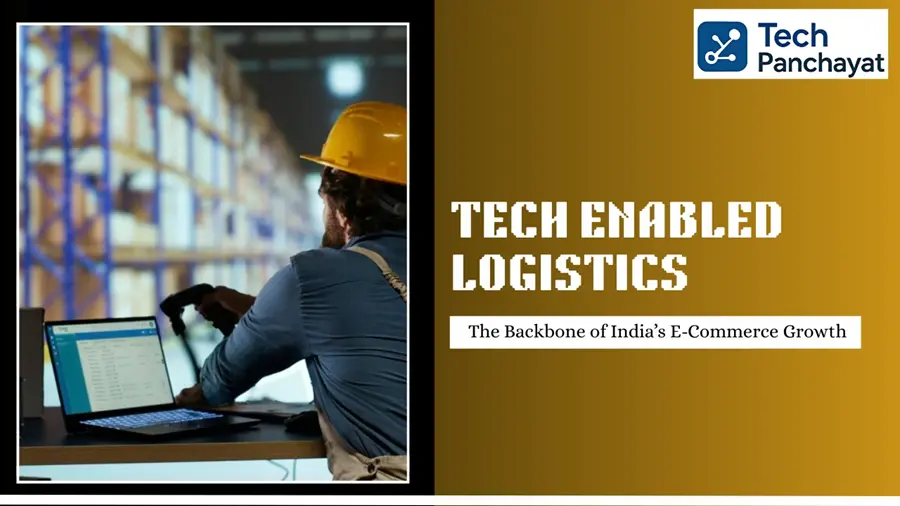What is Tech-Enabled Logistics?
Tech-enabled logistics refers to the use of advanced technologies such as artificial intelligence (AI), automation, Internet of Things (IoT), robotics, and data analytics to manage and optimize the entire supply chain. It goes beyond traditional logistics by making processes smarter, faster, and more efficient. From inventory management and warehouse operations to transportation and last-mile delivery, It ensures real-time visibility, reduces errors, cuts costs, and improves customer satisfaction. In the context of India’s e-commerce boom, it acts as the backbone that supports rapid growth and seamless delivery experiences.
Introduction to Tech-Enabled Logistics in India
India’s e-commerce sector has experienced exponential growth in the last decade, fueled by rising internet penetration, affordable smartphones, and a shift in consumer shopping habits. But behind every successful online purchase lies a highly complex supply chain powered by tech-enabled logistics. From warehousing and inventory management to order tracking and last-mile delivery, the role of tech-enabled logistics cannot be overstated. By integrating automation, artificial intelligence, real-time tracking, and advanced data analytics, companies are ensuring that goods reach customers faster, safer, and at lower costs. In short, tech-enabled logistics has become the backbone of India’s booming e-commerce economy, making convenience-driven shopping possible for millions of consumers every day.
Why Tech-Enabled Logistics is Critical for E-Commerce
E-commerce depends on timely deliveries and efficient supply chain management. Without strong logistics, online retailers cannot meet customer expectations of fast, reliable service. Technology-driven logistics ensures accuracy, reduces costs, and enhances customer satisfaction, making it the foundation of e-commerce growth in India.
Key Technologies Driving Tech-Enabled Logistics in India
Artificial Intelligence (AI) and Machine Learning in Tech-Enabled Logistics
AI and ML help companies forecast demand, optimize delivery routes, and improve decision-making. These tools analyze data patterns to streamline operations, reduce delays, and enhance customer experience.
Automation & Robotics Transforming Tech-Enabled Logistics Warehousing
Automated systems and robotics in warehouses speed up order processing and improve accuracy. Robots assist in sorting, packaging, and managing inventory, reducing human error and labor costs.
IoT and Real-Time Tracking in Tech-Enabled Logistics
IoT devices allow companies and customers to track shipments in real time. This transparency builds trust and ensures accountability throughout the supply chain.
Blockchain for Secure Tech-Enabled Logistics Operations
Blockchain enhances security and transparency in supply chain transactions. By recording every step of the logistics process, it minimizes fraud and improves efficiency.
Drones & Autonomous Vehicles in Tech-Enabled Logistics
Though still emerging in India, drones and autonomous vehicles have the potential to revolutionize last-mile delivery, especially in rural and hard-to-reach areas.
Last-Mile Delivery: The Biggest Challenge in Tech-Enabled Logistics
Last-mile delivery remains the most critical and challenging aspect of e-commerce logistics. It involves delivering the product from the distribution center to the customer’s doorstep. Factors like poor infrastructure, traffic congestion, and high delivery costs make this stage complex. Companies are investing in technology, micro-warehousing, and local delivery partners to overcome these hurdles.
Warehousing & Inventory Optimization with Tech-Enabled Logistics
Efficient warehousing is essential to meet the fast-paced demands of e-commerce. It allows real-time inventory management, reducing stockouts and overstock situations. Smart warehouses use AI, automation, and IoT devices to manage goods effectively and ensure quicker dispatch.
Sustainability and Green Practices in Tech-Enabled Logistics
As e-commerce grows, so does its carbon footprint. Companies are adopting eco-friendly practices like electric delivery vehicles, recyclable packaging, and route optimization to reduce emissions. Technology-driven logistics ensures that sustainability aligns with operational efficiency.
Global Comparisons: Tech-Enabled Logistics in India vs. The World
While India has made significant strides, countries like China and the U.S. are ahead in adopting drone delivery, automated fulfillment centers, and large-scale AI-driven logistics. However, India’s unique challenges are driving innovative solutions tailored to its diverse geography and consumer base. Lets Understand with a Table :
| Country | Key Adoption | Notes / Unique Practices |
|---|---|---|
| India | AI-driven routing, EV fleets, micro-warehousing, IoT tracking | Solutions tailored to diverse geography, dense urban areas, and dispersed rural populations |
| China | Drone deliveries, automated fulfillment centers, AI-powered supply chains | Advanced drone logistics in rural areas; highly automated mega-warehouses |
| USA | Amazon Prime Air (drone delivery), large-scale AI & robotics in warehouses | Fast delivery focus, strong tech infrastructure, regulatory support for automation |
The Future of Tech-Enabled Logistics in India’s E-Commerce
The future of e-commerce in India will be shaped by advancements in technology-driven logistics. With growing investments in AI, automation, and green practices, logistics will become more efficient, sustainable, and customer-centric. The sector is expected to see innovations that bring faster, cheaper, and more reliable deliveries across the country.
Conclusion: Why Tech-Enabled Logistics is the Backbone of Growth
The rise of India’s e-commerce industry is inseparable from the rapid evolution of logistics With technologies like AI, IoT, robotics, and blockchain transforming every stage of the supply chain, businesses can now achieve unprecedented efficiency and transparency. While challenges such as last-mile delivery and sustainability remain, ongoing innovation in tech-enabled logistics is bridging these gaps. As global competition intensifies, Indian e-commerce players who invest in smarter, greener, and more agile smart logistics solutions will be best positioned to lead the market. Ultimately, the future of digital commerce in India depends on how effectively we continue to strengthen and scale the true backbone of growth.




